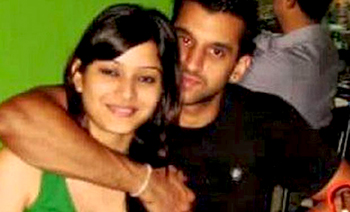Mumbai, Aug 27: Investigators in the sensational Sheena Bora murder case are not ruling out the "honour killing" angle after it came to light that both Peter Mukherjea and main accused Indrani allegedly disapproved of the "relationship" between his son Rahul and the victim.
 According to police, Sheena and media baron Peter's son from an earlier marriage, Rahul, were dating for over a year which their family did not like.
According to police, Sheena and media baron Peter's son from an earlier marriage, Rahul, were dating for over a year which their family did not like.
"Although the motive behind the murder still remains a mystery, we are probing all the angles as we strongly suspect honour killing in this case," said a police inspector requesting anonymity.
Meanwhile, Indrani Mukerjea's former husband Sanjeev Khanna, who was arrested from Kolkata yesterday, will be produced in a court here today, police said. Khanna, a resident of Hastings Road area in Kolkata, was arrested from his friend's flat in Alipore for his alleged involvement in the murder.
Also, police are trying to ascertain whether Sheena had herself e-mailed her resignation to Mumbai Metro in 2012, the year she was killed, the inspector said. Sheena was kidnapped from outside the National College in western suburbs. She came here from Assam in 1990s along with Indrani and completed BA Economics from St Xavier's College.
In June 2011, she got a job with Reliance Mumbai Metro but suddenly stopped coming to duty after some time, police said. In the same year, her Facebook account was deactivated.
Police had unearthed remains of a decomposed body three years ago after villagers at Gagode in Pen tehsil complained of foul odour emanating from the area. According to Mumbai Police Commissioner Rakesh Maria, the the victim was strangulated to death and her body set afire after pouring petrol. The murder took place on 24 April, 2012 and the body was found by Raigad police on May 23, he said.
Maria also said that Khanna is an accused in the case. Police also claimed that the former Star India CEO's wife Indrani was present at the site in Raigad district where Sheena was killed.
As investigators dug deeper into the mystery of the death of the 24-year-old, a complex web of lies and relationships unravelled and it emerged that Sheena was Indrani's daughter and not sister as maintained earlier. The victim is stated to be Indrani's daughter from an earlier marriage with one Siddharth Das.
Intriguing claims also came to light that 43-year-old Indrani had introduced her daughter and son to people as sister and brother. After the murder, she is also said to have claimed that Sheena had gone to the US for higher studies.
Peter Mukherjea said he had believed that the victim was Indrani's sister and not her daughter while accused's son Mikhail said Sheena was the daughter and not the sister of Indrani.
"I have no doubt my mother Indrani killed my sister Sheena Bora," he said yesterday. He claimed to know the "exact reason" but said that he would not reveal it until his mother confesses to it.
Mikhail said he had not heard from his sister since February 2012 and whenever he inquired about her with his mother she used to say Sheena was in the US. He said Sheena had gone to Mumbai alone since she was doing a job there.
Peter said he would cooperate with investigators in the probe. "I have never experienced anything like this before. The news I am getting, the kind of crime that has been committed, I would have never expected.
"Whatever help, information, police need, I am happy to help them with that. I would be absolutely clear and straight with them and cooperate," he said yesterday. Peter said he was unaware that Sheena went missing.
"(Sheena's disappearance) is something I am finding out now. I was told that Sheena has gone to the US. I am not on Facebook, but I was shown these pictures of Los Angeles or wherever she was. I didn't have her contact number. My son had told me 'see, something is not right', but I said her parents may not be happy with it, so she might have moved to the US... that I told him... He (Peter's son) didn't talk to me then."
Indrani was arrested by Khar Police on August 25 over her alleged role in the murder of Sheena in 2012. After her arrest, she was produced before Bandra Metropolitan Magistrate court, which remanded her in police custody till August 31.
According to police, the driver of Indrani has claime d that it was Indrani who killed Sheena and was present at the murder spot. As per Maria, on August 21, Khar police had arrested Indrani's driver in connection with an Arms Act case, adding he confessed to the murder and was taken to the murder spot.
Mumbai police has also summoned Peter's brother Gautam Mukerjea in connection with the case. The city police have also seized the passport of Indrani besides her laptop and mobile phone.
Last night, police quizzed Rahul, who reportedly had been in a relationship with the deceased.





Comments
Add new comment